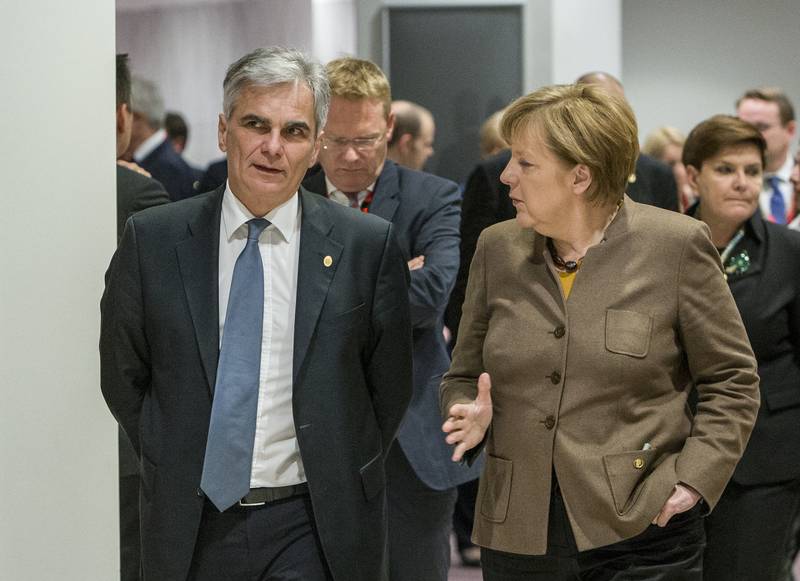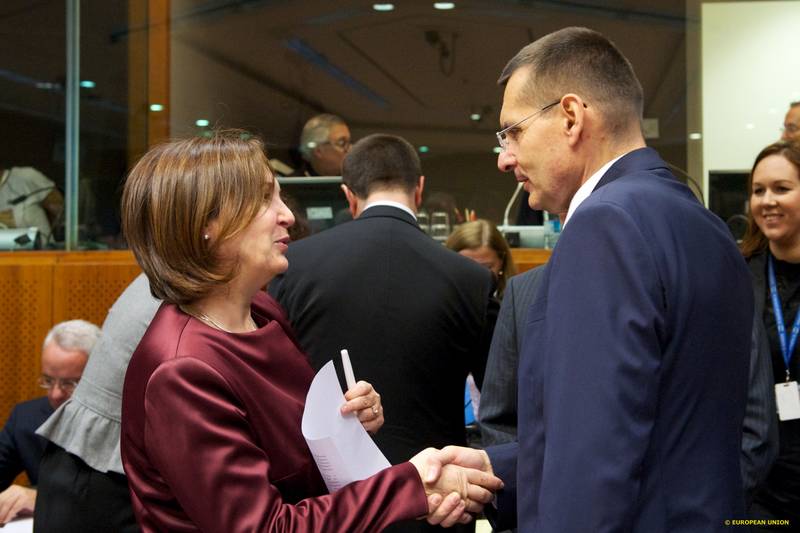A Matter of Trust
Ralitsa Kovacheva, September 27, 2011
 The accession of Bulgaria and Romania to Schengen has been postponed, due to internal problems in the Netherlands and Finland. This is the official explanation the Bulgarian citizens were given by the government, in the face of Minister of Foreign Affairs Nickolay Mladenov and Deputy Prime Minister and Interior Minister Tsvetan Tsvetanov.
The accession of Bulgaria and Romania to Schengen has been postponed, due to internal problems in the Netherlands and Finland. This is the official explanation the Bulgarian citizens were given by the government, in the face of Minister of Foreign Affairs Nickolay Mladenov and Deputy Prime Minister and Interior Minister Tsvetan Tsvetanov.
Several days before the Justice and Home Affairs Council on the 22nd of September, Tsvetan Tsvetanov said: "Each country has specific characteristics of governance and of the majority that supports a given government. The Netherlands is currently ruled by nationalists who are always more acute regarding such European policies. Let's see at the Council of Ministers and whether the Netherlands would be isolated from all the other 26 countries, and this will be perhaps, for the first time, a country to be discriminated in such way."
As we saw clearly, the Netherlands was neither "isolated", nor " discriminated ". Not only because its position against Bulgaria's and Romania's accession to Schengen was supported by Finland, but because each of the 27 Member States is entitled to its own position. That’s why the unanimity rule exists – in order to be clear that everybody will express a position which is to be respected, and the decision is a result of consensus.
In fact, I expected the Hague and Helsinki to react to the Bulgarian statements that their governments were held hostage by populists and nationalists, moreover, that representatives of the European Parliament spoke in a similar style. As Minister Tsvetanov said himself, after the meeting of interior ministers, the representatives of the Netherlands and Finland had explained that they had no mandate to support Schengen enlargement. This means that they have not been authorised by their governments, parliaments and, ultimately - by their citizens to take a positive decision.
Because, whatever the political situation in both countries is, it is a result of their citizens' will, democratically expressed through elections. Moreover, the issue of Schengen enlargement cannot be viewed in isolation from all the events that have overtaken the EU in the past year, especially the Arab spring and the subsequent immigrant influx, as well as the debt crisis in the eurozone. Since the changes in the Schengen governance have yet to be discussed, let's see how the political situation in the Netherlands and Finland affects their positions on dealing with the debt crisis.
The fact is that the minor coalition partner in the Dutch government is the Freedom Party of Geert Wilders, defined as populist, xenophobic and anti-immigrant. Prime Minister Mark Rutte himself has come to power with some eurosceptic ideas. However, the Netherlands has not threatened even once the rescue operations in the euro area. The country took a strong (usually pro-German) position on the key issues and proposed drastic reforms of the eurozone's governance with an expulsion option, but it never tried to blackmail its European partners, or countries seeking bailouts. So, here the argument of the nationalists being more acute in terms of European policies clearly exhales.
However, this is not exactly the case in Finland, which also has a coalition government, consistent not of two, but of six different parties, so Prime Minister Jyrki Katainen must use all forces and means to balance them and provide their consent (note, that the main coalition partner of Jyrki Katainen's National Coalition Party – the Social Democrats, voted against the loans of Greece and Ireland in the previous Parliament, without being a "populist" party). Moreover, although it does not participate in the government, the populist party “True Finns” is a third parliamentary force.
Finland's position has twice set EU's teeth on edge in terms of the debt crisis, first putting its own conditions for the Portuguese bailout and, therefore, for its participation in any future rescue loans, and second - asking for collateral in exchange to its part in the second Greek loan. Negotiations on the issue have been stalled for a second month now.
Against this background, by mid-October the eurozone's national parliaments must approve changes in the rescue fund (EFSF), agreed on 21 July. They will allow the fund to widen significantly its functions and to become a key instrument to address the debt crisis. Finland is exactly one of the countries where problems are expected in securing parliamentary support.
Imagine how in this situation the governments in both countries should provide both political support for the EFSF changes and the Schengen accession of Bulgaria and Romania. Imagine the phone calls and informal meetings, where promises are exchanged and compromises are made. Meanwhile, France and Germany on the one hand, and the European institutions on the other put pressure the changes in the rescue fund to be approved at any cost. I am telling you all this because it shows the entire context of the situation at first, and second - how wrong and simplistic it is to explain the position of the Hague and Helsinki entirely with their "internal problems".
Yes, we can say that in this sense Bulgaria and Romania got the short end of the stick - discussions on their Schengen membership to coincide with crucial decisions for the euro area and thus to become a bargaining card in domestic political debates in some countries. However, if we use a football metaphor, it is the same as if a team qualifying for the World Cup finals would not push to win all its matches in the group, relying on favourable results from the other matches.
Because the truth is that if Finland rather did not comment on the Schengen issue, the Netherlands had had a clear and unambiguous position, expressed repeatedly in the past year. Moreover, the government's coalition agreement specifically states that Romania and Bulgaria cannot be adopted in Schengen, while no results in fighting organised crime and corruption are reported by the European Commission in its CVM (Cooperation and Verification Mechanism) reports.
Until two days ago the Bulgarian government simply ignored this fact. Moreover, it ignored the fact that the link between Schengen membership and the CVM, albeit informal, had been politically formalised. Yes, there is no such link in the Schengen criteria and there cannot be such because the CVM has been created and introduced especially for Bulgaria and Romania in 2007. So in this regard, we could blame in formalism those who deny this link, rather than those who underline it.
I will not explain here why the Netherlands and Finland (and not only) consider it necessary to trust Bulgaria's judicial system and rely on a rule of law. I will elaborate on populism instead. Both governments were quickly accused that they had succumbed to populism, blocking Bulgaria's and Romania's Schengen membership. But if the Dutch government does not meet its coalition agreement, how will it explain this to its own citizens? If, as a result, the government were to collapse? Is it populism when a government respects its own programme documents? Is it populism to respect the will of a coalition partner, which by the voters' will is a third parliamentary force?
And vice versa – isn't it populism the Bulgarian citizens to be persuaded for two years that the government has regained Brussels's trust, that Schengen is a national priority, that the technical readiness is sufficient to ensure membership? Isn't it populism the blame for this failure (because it is a failure when you don’t achieve a national priority) to be attributed solely to foreign circumstances? Isn't it populism the prime minister of the state is keeping quiet about the issue, without explaining to the citizens why his promise has not been fulfilled? To explain what does this "lack of trust” mean, which his partners in Brussels talk about?
Boyko Borissov's silence is more eloquent than all his talk for the past two years. It is even more disrespectful towards the Bulgarian citizens than all his ornate statements, cited by the media with unjustified sense of humour.
Ironically, the Schengen slap sounded just one day before the start of the election campaign in Bulgaria. Although a recent opinion poll of the Open Society Institute showed that whatever happened in terms of Schengen, it would not change the electoral behaviour of Bulgarians, I still think that elections are a time for political evaluation. And it is high time Bulgarian voters to give their political evaluation, but not on promises, ribbon cutting ceremonies and meatballs (usually given by the political parties to voters) but according to the Schengen criterion: the trust.
 Werner Faymann, Angela Merkel | © Council of the EU
Werner Faymann, Angela Merkel | © Council of the EU Rumyana Bachvarova, Petre Toba | © Council of the EU
Rumyana Bachvarova, Petre Toba | © Council of the EU Meglena Kuneva | © Council of the EU
Meglena Kuneva | © Council of the EU